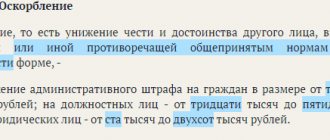During times of repression, a deliberately false denunciation was a fairly common tool to get rid of a neighbor or colleague. Fortunately, such times have passed, and today it is hardly possible to meet a person who will inform on his neighbor on the site. Moreover, such citizens cause serious problems for government agencies, sometimes reporting unreliable and even fictitious information.
Regulates issues related to knowingly false denunciation Art. 306 of the Criminal Code of the Russian Federation. It is in this provision of the criminal code that the term is defined, and the differences between this concept and the term “slander” are indicated. All issues related to the concept of knowingly false denunciation, its differences from slander and examples from judicial practice will be discussed in this article.
Comments on the article
In the comments to Art. 306 of the Criminal Code of the Russian Federation, a knowingly false denunciation is interpreted as an act deliberately aimed at misleading the justice authorities. As a rule, the guilty person sends a statement to the police or to the court, where he provides obviously false information, thereby forcing the authorities to waste time and material resources of the state on committing a crime that does not exist in nature. In addition, a false denunciation may affect the interests of other participants in the case, victims or witnesses, which will also cause damage to the overall investigation.
The corpus delicti of a knowingly false denunciation is formed erroneously and becomes the reason for initiating further investigation or legal proceedings.
Corpus delicti
Like all crimes covered by Article 31 of the Criminal Code of the Russian Federation, false denunciation is an act against justice. The main object of the crime is the normal work of the investigative and inquiry bodies. All false accusations lead to the fact that the natural course of the investigation is disrupted and, accordingly, the court may make an incorrect decision.
Also, an additional object of crime is the rights of the individual, his interests, honor and dignity, and often even health.
The objective side of the case and the nature of the information presented by the false informer
Denunciation is the communication to law enforcement agencies of knowingly false information about a person who has committed or is preparing a crime. The information may be completely false or partially. In this way, the informer can report a crime that was not committed, as well as distort information about the scene of the incident and slander an innocent person.
Information about a false denunciation is characterized as follows:
- The information does not correspond to reality at all;
- Contains information about the objective and subjective aspects of the crime.
Denunciation is made either in writing, or an oral statement is also allowed.
Subject and subjective side
For intentional false denunciation, liability begins at the age of 16. This act will be considered completed as soon as the person informs law enforcement agencies about a crime committed or being prepared.
The initiation of a criminal case may influence the qualification of an act when a court verdict is passed:
- The intent of a false denunciation is only direct, since the criminal deliberately informs law enforcement officers of knowingly false information and misleads the investigation;
- During the investigation, the motive of the attacker is revealed, but it will not affect the qualification of his act.
Arbitrage practice
There are enough examples in judicial practice concerning issues of deliberately false denunciation to get a complete picture of the nuances that may arise in the course of such cases. For this purpose, we present excerpts from several cases considered in court.
Example No. 1.
In January 2021, the man filed a statement of defense against charges of knowingly false denunciation. Law enforcement agencies were the prosecution. The man did not admit his guilt, and the police officer claimed that the citizen knowingly falsely accused him of causing bodily harm.
Due to the fact that the injuries were recorded and there were witness statements in the case, all charges against the man who applied were dropped, and a criminal case was opened against the employee for abuse of official authority.
Example No. 2.
Citizen T. appealed to the district court with a statement that the chief accountant of the enterprise where he is employed periodically commits thefts from his wages.
As a result of such an appeal, a comprehensive audit of all accruals and payments at the enterprise was carried out, during which the facts of theft on the part of the accountant were not proven. At the same time, criminal actions were discovered on the part of the company’s management, who illegally withdrew funds from the company’s cash register during the payment of wages.
Thus, citizen T. was caught and subsequently charged with knowingly false denunciation. The accountant received moral compensation in the amount of 100 thousand rubles, and the head of the enterprise became the guilty party and was also sentenced to a fine and criminal liability.
Breaking Bad
But the second paragraph of Art. 306 of the Criminal Code already indicates so-called aggravating circumstances. They, of course, will be punished much more seriously than a crime without special features.
What is written in the law? For example, measures to prevent repeated lies in parallel connection with a serious or especially serious crime. In this situation, you can still get away with a fine. It increases to 300 thousand rubles, and also appears at least 100 thousand. If we talk about payments expressed as the income of the convicted person, then the framework is set from 12 to 24 months inclusive.
Social work is also not excluded. But compulsory work no longer takes place. Exactly the same as correctional ones. Instead, there is only forced labor for no more than 36 months. Or, as they say, no more than 3 years. In such a situation, there is every chance of going to jail. Moreover, they are highly likely to be used. Imprisonment cannot be imposed for more than the amount of forced labor. That is, a limit of 3 years has been established.
How to prove a knowingly false denunciation in court
The current legislation stipulates how to prove a knowingly false denunciation. It was initially determined that a false denunciation will always be a false accusation of a crime committed by a specific person. In fact, such a statement indicates the person(s) who allegedly committed the criminal act.
As a result, a false crime is formed, which provokes the development of actions aimed at illegally bringing a third party to criminal liability.
The most important sign of a false denunciation in court is that the crime indicated in it is not true. If this fact is proven, the citizen who filed the application will be considered guilty of filing a knowingly false denunciation and will be held accountable.
Can they be rejected and what to do in this case?
In this case, you should pay attention to the federal law “On the Police in the Russian Federation”. It indicates within what time frames citizens' appeals must be considered.
Attention! The maximum deadline for considering citizens' appeals is 10 days.
It is needed so that if a complaint is sent that requires detailed study and analysis, the police official can make the right decision on it. In general, the application is considered within a period not exceeding three days.
Of course, not in all cases the application can be accepted for processing. There are several reasons for refusal:
- Lack of corpus delicti.
- Absence of guilt of the person indicated in the application as a criminal.
- Expiration of the statute of limitations for prosecution, etc.
In the event that there is a delay in the time allotted for consideration of the application, or an illegal refusal to accept the application occurs, the citizen has the right to appeal . The first step is filing a complaint with the official's supervisor.
If this does not bring any results, you can submit a complaint directly to the regional department of the Ministry of Internal Affairs or to the Ministry of Internal Affairs. also has the right to appeal to the court, where his case will be considered in administrative proceedings .
Slander is different from a deliberately false denunciation
A knowingly false denunciation differs from slander. The differences are quite significant, despite the external similarity of the phenomena. Slander is quite common and is defined as the dissemination of knowingly false information about another person. At the same time, not every slander can be interpreted as a false denunciation.
The main difference between slander and a deliberately false denunciation is that false information expressed about another person can acquire the status of a false denunciation only when announced in the presence of government officials capable of initiating a criminal case. The list of such institutions includes:
- bodies of inquiry;
- prosecutor's office;
- police Department;
- investigative authorities;
- Customs;
- tax office.
For example, a citizen reports that a person known to him committed a crime, although in fact he does not have such information. Such a statement made in the presence of employees of one of these institutions is a false denunciation.
If a citizen says that a criminal act is being committed, but without specifying the facts, the reported data is slander, but not a false denunciation. Accusing any person in the media is also not considered a knowingly false denunciation. In this case we are also talking about libel.
Some types of false denunciation are qualified using not Article 306 of the Criminal Code of the Russian Federation, but using Art. 307 of the Criminal Code of the Russian Federation (false testimony of witnesses) or Art. 207 of the Criminal Code of the Russian Federation (report of a terrorist act). False denunciation in Article 285 of the Criminal Code of the Russian Federation prescribes punishment for officials who exceed their powers.
How to contact the Ministry of Internal Affairs via the Internet
You can submit an online application to the Ministry of Internal Affairs about an offense in 2020 in all regions without registration through:
- website of the Ministry of Internal Affairs of the Russian Federation;
- website of the Ministry of Internal Affairs of your region;
- mobile application of the Ministry of Internal Affairs.
IMPORTANT!
Through the Gosuslugi website, in most parts of Russia, appeals are available only to the prosecutor’s office; whether it is possible to file a complaint online with the police in your region is checked in the user’s account.
Please note that if a crime has occurred, an event that directly threatens personal and public safety at the present time, you should promptly call 02 from a landline phone and 102 from a mobile phone. For other requests, read the step-by-step instructions on how to write a police report online, where to find the form and when to expect a response.
Step 1. On the main page of the Ministry of Internal Affairs website, click the “For Citizens” section button. Select the item “Reception of requests from citizens and organizations.”
Step 2. In the list of departments, select the desired department, mark it by checking one of the boxes. Information about the functions of the department will open; after selecting the department, click “Continue” at the bottom of the page.
Step 3. Read the information provided, check the box confirming that you have read it, and click “Submit an appeal.”
Step 4. Fill out the form that opens - option for the regional website of the Ministry of Internal Affairs of the Tver Region.
Step 5. Having selected a territorial division, fill in the information and indicate the address for response and the location of the event that you intend to report.
Step 6. If your written request is repeated, provide information about where and when you already wrote. Fill out the “Text of Appeal” window - the police application form to fill out is not approved by law. It is better to prepare the text that you enter into the online form in advance. Attach files with the necessary documents (if any). Send a request.
Deliberately false denunciation of the Code of Administrative Offenses of the Russian Federation
This type of criminal act in some cases may also provide for administrative punishment. Regulates issues related to false denunciation of the Code of Administrative Offenses of the Russian Federation in Article 17.9. According to the paragraphs of this article, punishment can be applied in the event of knowingly giving false testimony by witnesses, specialists, and experts. Sometimes this may involve providing a deliberately false translation. Such an act entails a fine of 1,000 - 1,500 rubles.
| Pass during quarantine | Payment and registration of sick leave during quarantine |
| Article 6.3 of the Code of Administrative Offenses | Article for violating the self-isolation regime |
- Didn't find the answer to your question? Find out how to solve exactly your problem - call right now:
- Federal number -
- Moscow region, Moscow -
- Leningr. region, St. Petersburg -
- It's absolutely free and fast!
Payments
If you were already familiar with criminal law in Russia, then you can most likely guess where the whole process begins. After all, the first measure to combat criminal offenses (not all, but the majority) is fines. Monetary penalties for many criminals are a compelling reason to abstain.
Part 1 art. 306 indicates that knowingly false reports by citizens are punishable by a fine. Its size may vary. Either it is fixed (up to 120,000 rubles) or is expressed as the income of the offender. Here the final decision rests with the court. But there are limitations in this matter. The fine, expressed by the person's income, cannot be higher than the amount he received in 12 months. Nothing difficult, right? In simple terms, you can either receive a recovery of specific money or lose income for a period of no more than one year.






